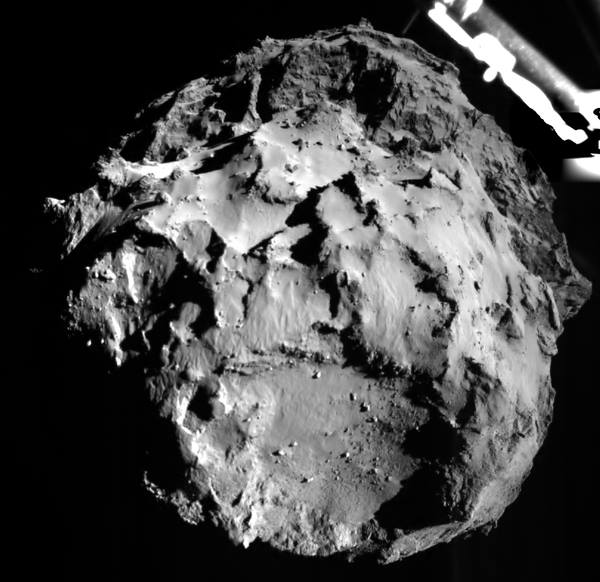Its been a big week for Space. I am hugely supportive of NASA, ESA and anything to do with space exploration. I also adore science fiction. I was thus thrilled that in the past week I was able to see Christopher Nolan’s Interstellar AND watch with wonder as the European Space Agency’s comet-hopper Philae landed on comet 67P / Churyumov–Gerasimenko. While there were a few holes in Interstellar‘s plot and screenplay (but the science was decent – See Kip Thorne’s work), I still found it to be one of the most engaging films I have seen in a long time. I was utterly transported both by the realistic portrayal of interpersonal connection and the soaring (and fairly scientifically-sound) romp through the cosmos (see Science Behind Interstellar and Neil DeGrasse Tyson‘s piece).
Moreover, the fact that Homo sapiens LANDED ON A COMET (!!) thrills me beyond imagination. The comet-hopper Philae left earth over 10 years ago to initiate its mission to evaluate the “elemental, isotopic, molecular and mineralogical composition of the cometary material, the characterisation of physical properties of the surface and subsurface material, the large-scale structure and the magnetic and plasma environment of the nucleus.” (see Bibring et al 2007). In an age where exploration and basic science seem to be ever more fragile and under siege, such an accomplishment gives me hope…
But, I worry too about the message yielded by Interstellar and response to ESA’s accomplishment. There were many messages in Interstellar – the one that I liked the most is that ultimately the most important thing in life is love and interpersonal connection. But, another of its pre-eminent messages is that we should just give up on what we have HERE. Indeed, the premise of the film is that Earth is ecologically devastated beyond rescue, and that the only way to save our species is to ditch the planet and go elsewhere (with the help of a worm hole). I worry deeply about how this impacts audience viewers who are already trying to distract themselves from their anxiety about the state of our planet. It can result in paralysis and apathy.
And, while the accomplishment of landing on a comet utterly BLOWS MY MIND and thrills me to the core, I hope emphatically that people do not see it as an example of how “technology will save us”. As a conservation biologist and ecologist, I hear this all the time and believe this view gives people an excuse to not take care of our planet now.
My categorical and resounding perspective is that we SIMPLY DO NOT HAVE THE LUXURY to give up and just hope that somehow technology will eventually bail us out of trouble!!! There is no bail out. We can and must do something about the home that we have NOW. Do not let some vague sense that some how technology will save us influence your decisions about how to use the planet’s resources.
That’s all.
Some links to check out:
>> On the Science of Interstellar, by Dr. Ikjyot Singh Kohli
>> Neil DeGrasse Tyson Separates Fact from Fiction, NPR
>> Thorne, K (2014) The Science of Interstellar. New York, NY: WW Norton Publishers

